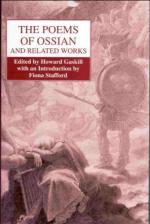|
This section contains 3,807 words (approx. 13 pages at 300 words per page) |

|
SOURCE: "Macpherson, Chatterton, Blake and the Great Age of Literary Forgery," in The Centennial Review, Vol. XVIII, No. 4, Fall, 1974, pp. 378-91.
In the following essay, Folkenflik argues that eighteenth-century English culture made literary forgery both practically and imaginatively useful for several different writers, including Macpherson.
It is no accident that the later eighteenth century was the great age of literary forgery. Macpherson, Chatterton, Pinkerton and Ireland (Steevens is perhaps another case) share a world which made forgery an innovative answer to a difficult series of questions which faced the wouldbe artist. The circumstances are fairly familiar, but the problems they posed have only recently been receiving any attention.
The chief question consciously or unconsciously asked by the ambitious was, "How can I be a great poet now?" In what follows I shall be concerned primarily with Macpherson, for though we do not consider him to be among the...
|
This section contains 3,807 words (approx. 13 pages at 300 words per page) |

|


